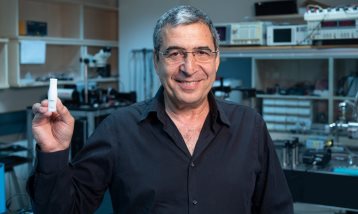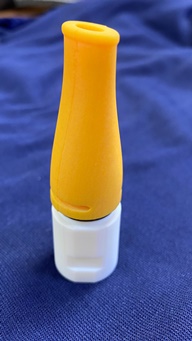COVID-19 samples can be collected using a simple breath test or throat and nose swabs
BEER-SHEVA, Israel, May 13, 2020 – Ben-Gurion University of the Negev's Prof. Gabby Sarusi has developed and is now validating a test that identifies carriers of the COVID-19 virus in less than a minute with greater than 90% accuracy and at a dramatically lower price than any other method available. Clinical trials in conjunction with the Defense Ministry on more than 120 Israelis had a better than 90% success rate compared to Polymerase Chain Reaction (PCR) tests. The ongoing trials will seek to determine if the test can identify the specific stage of COVID-19 infection as well as its presence.

"Right from the beginning of the trials, we received statistically significant results in line with our simulations and PCR tests," says Prof. Sarusi, deputy head for research at the School of Electrical and Computer Engineering and a faculty member of the Electro-Optical Engineering Unit at BGU.
"We are continuing clinical trials and will compare samples from COVID-19 patients with samples from patients with other diseases to see if we can identify the different stages of the COVID-19 infection," according to Sarusi.
Prof. Sarusi developed his chip within the framework of BGU's Coronavirus Task Force, initiated by BGU President Prof. Daniel Chamovitz to harness the resources and ingenuity of the University to tackle the myriad aspects of the pandemic.
How does the test work?
Particles from a simple breath test or throat and nose swabs, such as are already currently used for other tests, are placed on a chip with a dense array of metamaterial sensors that was designed specifically for this purpose. The system then analyzes the biological sample and provides an accurate positive/negative result within a minute via a cloud-connected system. The point-of-care device automatically backs up the results into a database that can be shared by authorities, making it easier than ever to track the course of the virus, as well as triage and treat patients.
The new method is based on the change in the resonance in the high frequency spectral range imposed by the coronavirus through a spectroscopy performed on the device. This spectral range has been employed in recent decades for the fast detection and identification of biological samples.
“We asked ourselves, since this virus is just like a nano-particle or a quantum dot with a diameter between 100nm to 140nm in terms of its size and electrical properties, can we detect it using methods from the worlds of physics, photonics and electrical engineering,” said Prof. Sarusi. “We discovered that the answer is yes, this virus resonates at high frequencies, and spectroscopy in these frequencies reveals it promptly."

Each test kit would cost between fifty to one hundred dollars to produce, which is far less than current laboratory testing. Moreover, because the test is electro-optical in nature, rather than biochemical, it is not sensitive to environmental factors that can affect results of current testing methods.
Current coronavirus test kits are based on amplifying and identifying the viral RNA sequences, and therefore depend on costly reagents and biochemical reactions. In addition, these PCR-based kits take hours, and in many cases days, to yield results and require logistically complicated shipping and handling of sensitive and infectious biological samples.